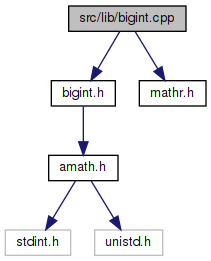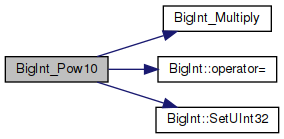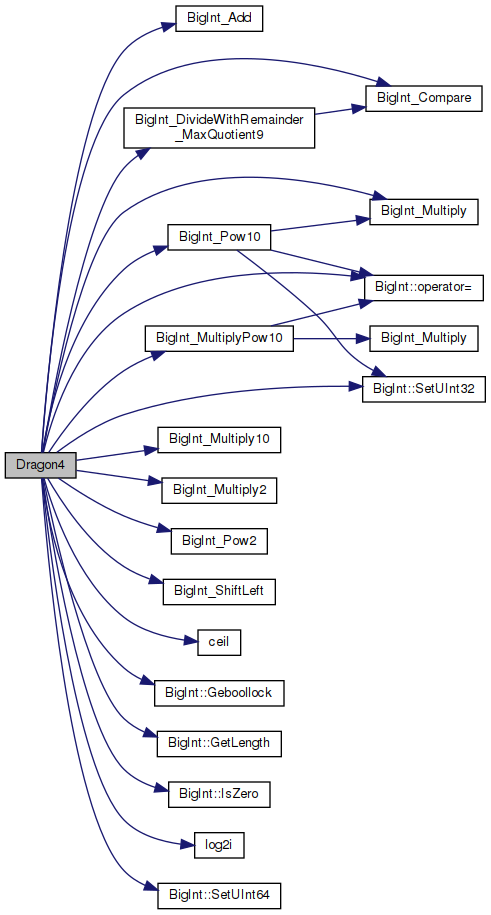
Go to the source code of this file.
Functions | |
| static int32_t | BigInt_Compare (const BigInt &lhs, const BigInt &rhs) |
| static void | BigInt_Add (BigInt *pResult, const BigInt &lhs, const BigInt &rhs) |
| static void | BigInt_Multiply (BigInt *pResult, const BigInt &lhs, const BigInt &rhs) |
| static void | BigInt_Multiply (BigInt *pResult, const BigInt &lhs, uint32_t rhs) |
| static void | BigInt_Multiply2 (BigInt *pResult, const BigInt &in) |
| static void | BigInt_Multiply2 (BigInt *pResult) |
| static void | BigInt_Multiply10 (BigInt *pResult) |
| static void | BigInt_Pow10 (BigInt *pResult, uint32_t exponent) |
| static void | BigInt_MultiplyPow10 (BigInt *pResult, const BigInt &in, uint32_t exponent) |
| static void | BigInt_Pow2 (BigInt *pResult, uint32_t exponent) |
| static uint32_t | BigInt_DivideWithRemainder_MaxQuotient9 (BigInt *pDividend, const BigInt &divisor) |
| static void | BigInt_ShiftLeft (BigInt *pResult, uint32_t shift) |
| uint32_t | Dragon4 (const uint64_t mantissa, const int32_t exponent, const uint32_t mantissaHighBitIdx, const bool hasUnequalMargins, const tCutoffMode cutoffMode, uint32_t cutoffNumber, char *pOubooluffer, uint32_t bufferSize, int32_t *pOutExponent) |
Variables | |
| static uint32_t | g_PowerOf10_U32 [] |
| static BigInt | g_PowerOf10_Big [] |
Function Documentation
◆ BigInt_Add()
Definition at line 79 of file bigint.cpp.
References BigInt::m_blocks, and BigInt::m_length.
Referenced by Dragon4().

◆ BigInt_Compare()
Definition at line 57 of file bigint.cpp.
References BigInt::m_blocks, and BigInt::m_length.
Referenced by BigInt_DivideWithRemainder_MaxQuotient9(), and Dragon4().

◆ BigInt_DivideWithRemainder_MaxQuotient9()
|
static |
Definition at line 452 of file bigint.cpp.
References BigInt_Compare(), BigInt::m_blocks, and BigInt::m_length.
Referenced by Dragon4().


◆ BigInt_Multiply() [1/2]
Definition at line 142 of file bigint.cpp.
References BigInt::m_blocks, and BigInt::m_length.
Referenced by BigInt_MultiplyPow10(), BigInt_Pow10(), and Dragon4().

◆ BigInt_Multiply() [2/2]
Definition at line 206 of file bigint.cpp.
References BigInt::m_blocks, and BigInt::m_length.
Referenced by BigInt_MultiplyPow10().

◆ BigInt_Multiply10()
|
static |
Definition at line 285 of file bigint.cpp.
References BigInt::m_blocks, and BigInt::m_length.
Referenced by Dragon4().

◆ BigInt_Multiply2() [1/2]
Definition at line 234 of file bigint.cpp.
References BigInt::m_blocks, and BigInt::m_length.
Referenced by Dragon4().

◆ BigInt_Multiply2() [2/2]
|
static |
Definition at line 262 of file bigint.cpp.
References BigInt::m_blocks, and BigInt::m_length.
Referenced by Dragon4().

◆ BigInt_MultiplyPow10()
Definition at line 388 of file bigint.cpp.
References BigInt_Multiply(), g_PowerOf10_Big, g_PowerOf10_U32, and BigInt::operator=().
Referenced by Dragon4().


◆ BigInt_Pow10()
|
static |
Definition at line 345 of file bigint.cpp.
References BigInt_Multiply(), g_PowerOf10_Big, g_PowerOf10_U32, BigInt::operator=(), and BigInt::SetUInt32().
Referenced by Dragon4().


◆ BigInt_Pow2()
|
inlinestatic |
Definition at line 438 of file bigint.cpp.
References BigInt::m_blocks, and BigInt::m_length.
Referenced by Dragon4().

◆ BigInt_ShiftLeft()
|
static |
Definition at line 537 of file bigint.cpp.
References BigInt::m_blocks, and BigInt::m_length.
Referenced by Dragon4().

◆ Dragon4()
| uint32_t Dragon4 | ( | const uint64_t | mantissa, |
| const int32_t | exponent, | ||
| const uint32_t | mantissaHighBitIdx, | ||
| const bool | hasUnequalMargins, | ||
| const tCutoffMode | cutoffMode, | ||
| uint32_t | cutoffNumber, | ||
| char * | pOubooluffer, | ||
| uint32_t | bufferSize, | ||
| int32_t * | pOutExponent | ||
| ) |
Definition at line 608 of file bigint.cpp.
References BigInt_Add(), BigInt_Compare(), BigInt_DivideWithRemainder_MaxQuotient9(), BigInt_Multiply(), BigInt_Multiply10(), BigInt_Multiply2(), BigInt_MultiplyPow10(), BigInt_Pow10(), BigInt_Pow2(), BigInt_ShiftLeft(), ceil(), CutoffMode_FractionLength, CutoffMode_TotalLength, CutoffMode_Unique, BigInt::Geboollock(), BigInt::GetLength(), BigInt::IsZero(), log2i(), BigInt::operator=(), BigInt::SetUInt32(), and BigInt::SetUInt64().
Referenced by DecimalSystem::GetText().


Variable Documentation
◆ g_PowerOf10_Big
|
static |
Definition at line 320 of file bigint.cpp.
Referenced by BigInt_MultiplyPow10(), and BigInt_Pow10().
◆ g_PowerOf10_U32
|
static |
Definition at line 308 of file bigint.cpp.
Referenced by BigInt_MultiplyPow10(), and BigInt_Pow10().
